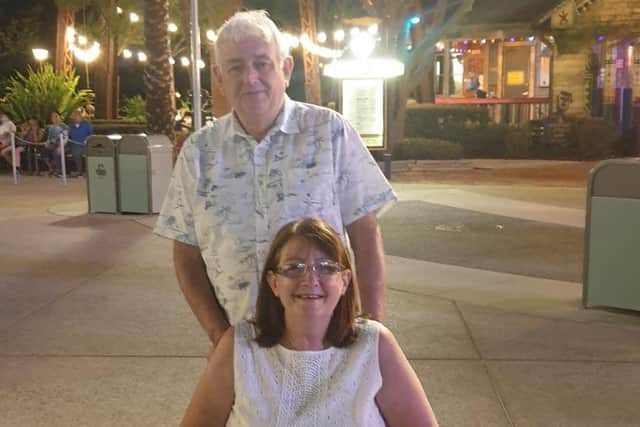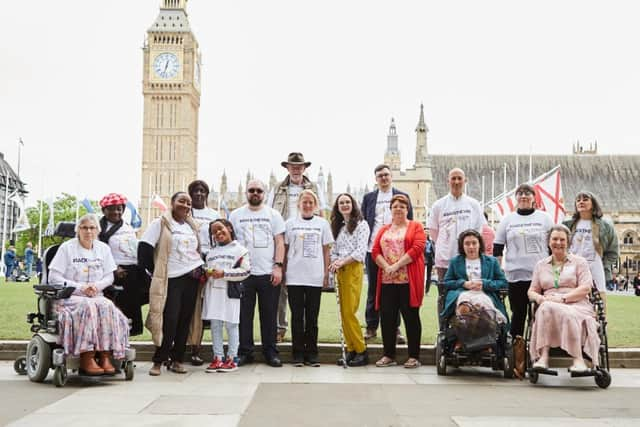Former Wakefield district councillor with rare terminal condition backs neurological campaign calling for more support
and live on Freeview channel 276
Every part of 59-year-old Susan Lodge’s life was turned on its head when she was diagnosed with primary lateral sclerosis (PLS) in 2012 and placed in palliative care.
PLS is a rare form of motor neurone disease (MND) which causes muscle weakness and loss of movement control and it has “changed everything” for Susan.
Advertisement
Hide AdAdvertisement
Hide AdHer lower body, arms, voice and breathing have all been affected and she now depends on friends and family to help her with all aspects of daily life.


Susan can no longer do things she once loved, such going out for meals or dancing with her husband of 38 years, Steven, and has even been left unable to perform everyday tasks like making a cup of tea.
She said: “People used to comment on how I walked and carried myself confidently. I used to love dressing nicely because I had a thing for shoes and handbags, but I can’t even shop for them anymore.
“PLS has changed everything but the thing I miss the most is dancing. I used to dance around the kitchen with Steven. Now, I have to dance from my chair.”
Advertisement
Hide AdAdvertisement
Hide AdThe former district councillor first noticed something was wrong in 2009, when she suddenly began losing her strength and balance and started falling over at meetings.


She underwent numerous tests for other conditions such as MS and Parkinson’s and even received a misdiagnosis of fluid on the brain before being told she had PLS in 2012.
Susan wants to raise awareness of neurological conditions and is supporting The Neurological Alliance campaign to bring about much needed change for people affected by neurological conditions.
She said: “When I was diagnosed, they just told me to go away, do as I wanted and to make sure my family knew my wishes.
Advertisement
Hide AdAdvertisement
Hide Ad“I wish people understood more about PLS and that it is a terminal illness. It has turned my whole life on its head and many healthcare professionals aren’t even aware it.”
The Neurological Alliance handed over a 19,000-strong petition to the Department of Health and Social Care on Monday, June 5. It called on the Government to back the one in six people affected by neurological conditions in the UK and calls for a UK-wide Neuro Taskforce to spearhead vital improvements in care and support.
The petition was a result of The Neurological Alliance’s 2022 ‘My Neuro Survey’ completed by more than 8,500 people affected by neurological conditions. It exposed significant shortfalls in mental wellbeing support, delays to accessing vital treatment and care and a lack of information and support at diagnosis.
Georgina Carr, Chief Executive of The Neurological Alliance, said: “Despite affecting millions of people and costing billions of pounds, neurological conditions are too often at the back of the queue.
Advertisement
Hide AdAdvertisement
Hide Ad"More than half of people who shared their experiences had experienced delays to routine specialist appointments in the last year and a majority hadn’t been asked about their mental wellbeing by a healthcare professional in the past three years. The message from people affected by neurological conditions is clear - this must change.”
Together with the petition, the Neurological Alliance exhibited a brand-new artwork in Parliament, which featured pictures from hundreds of people affected by neurological conditions across the country. It is hoped the artwork will help to raise awareness amongst MPs of the realities of living with a neurological condition.
Georgina said: “We must not ignore the fact that one in six people live with a neurological condition and many are not receiving the care and support they need.
“We stand united with over 100 organisations and 19,000 people to take immediate action. We urge governments across the UK to establish a Neuro Taskforce to address these unacceptable gaps in care and support for people with neurological conditions and deliver real change.”
Advertisement
Hide AdAdvertisement
Hide AdA UK-wide Neuro Taskforce would make a real difference by making sure everyone affected by neurological conditions has access to the right care at the right time and the workforce to support them. It would provide a framework to support greater collaboration and sharing of best practice in the approaches taken to tackle common problems. Fundamentally, and most importantly, it would help to show that governments across the UK are listening to people affected by neurological conditions.
Dr Arani Nitkunan, Consultant Neurologist, said: “My colleagues and I see the devastating impact neurological conditions can have every day. Despite our best efforts to provide the best support for everyone, we are overstretched and overlooked by commissioners. Ensuring neurological conditions are tackled through a Neuro Taskforce would help us go further and mean that people with neurological conditions and services like mine are listened to at the highest forms of Government.”
The Neurological Alliance is a coalition of over 90 organisations working together to improve services for the 1 in 6 people in the UK who live with a neurological condition and their families and loved ones. Its vision is for every person affected by a neurological condition to be able to access the right treatment, care and support at the right time.
It defines a neurological condition as any condition that affects the brain, spinal cord and/or nerves. Because these systems control your mind and body, neurological conditions can affect the way you think and feel and interact with the world.
Advertisement
Hide AdAdvertisement
Hide AdThere are over 600 neurological conditions, including dementia, ataxia, migraine, epilepsy, Tourette syndrome, Parkinson’s, multiple sclerosis, motor neurone disease and cerebral palsy.
If you need support, Neurological Alliance members may be able to help. Visit www.neural.org.uk to find out more.